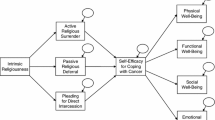Abstract
In this study we investigated the role of religious orientation in coping with stresses associated with cancer. A measure of daily coping and the Religious Orientation scale were administered to forty hematology-oncology patients in order to examine frequency of eight coping responses across religious orientations. It was found that proreligious and intrinsic participants used religion significantly more often than nonreligious and extrinsic types to cope with stresses associated with their cancer. We concluded that religious orientation and commitment influence the coping process, and suggest that religious commitment be included in studies of coping with cancer.
Similar content being viewed by others
References
Antonovsky, A.,Health, Stress, and Coping. San Francisco, Jossey-Bass, 1979; Lazarus, R. S., and Folkman, S.,Stress, Appraisal, and Coping. New York, Springer, 1984; Moos, R. H., ed.,Coping with Life Crises: An Integrated Approach. New York, Plenum, 1986.
Folkman, S., and Lazarus, R. S., “If It Changes It Must Be a Process: A Study of Emotion and Coping During Three Stages of a College Examination,”J. Personality and Social Psychology, 1985,48, 150–170.
Ibid..
Stone, A. A., and Neale, J. M., “New Measure of Daily Coping: Development and Preliminary Results,”J. Personality and Social Psychology, 1984,46, 892–906.
“Religion in America.” Princeton, N.J., The Gallup Report, 1985.
Gibbs, H. W., and Achterberg-Lawlis, J., “Spiritual Values and Death Anxiety,”J. Counseling Psychology, 1978,25, 563–569.
Fiefel, H., and Branscomb, A. B., “Who's Afraid of Death?”J. Abnormal Psychology, 1978,81, 282–288.
Martin, D., and Wrightsman, L. S. Jr., “The Relationship Between Religious Behavior and Concern about Death,”J. Social Psychology, 1964,65, 317–323.
Rosenstiel, A. K., and Keefe, F. J., “The Use of Coping Strategies in Chronic Low Back Pain Patients: Relationship to Patient Characteristics and Current Adjustment,”Pain, 1983,17, 33–44.
Acklin, M. W.; Brown, E. C.; and Mauger, P. A., “The Role of Religious Values in Coping with Cancer,”J. Religion and Health, 1983,22, 322–333.
Elkins, D.; Anchor, K. N.; and Sandler, H. M., “Relaxation and Prayer Behavior as Tension Reduction Techniques,”Behavioral Engineering, 1979,5, 81–87.
Gartner, A., and Reissman, F., “Health Care in a Technological Age.” InSelf-Help and Health. New York, New Human Services Institute, 1976.
op. cit..
Ibid..
Allport, G. W., and Ross, J. M., “Personal Religious Orientation and Prejudice,”J. Personality and Social Psychology, 1967,5, 432–443.
Donahue, M. J., “Intrinsic and Extrinsic Religiousness: Review and Meta-Analysis,”J. Personality and Social Psychology, 1985,48, 400–419.
op. cit..
op. cit..
op. cit..
Hood, R. W. Jr., “The Usefulness of the Indiscriminately Pro- and Anti- Categories of Religious Orientation,”J. Scientific Study of Religion, 1978,17, 419–431.
Ibid..
op. cit..
Author information
Authors and Affiliations
Rights and permissions
About this article
Cite this article
Meyer, M.S., Altmaier, E.M. & Burns, C.P. Religious orientation and coping with cancer. J Relig Health 31, 273–279 (1992). https://doi.org/10.1007/BF00981229
Issue Date:
DOI: https://doi.org/10.1007/BF00981229




